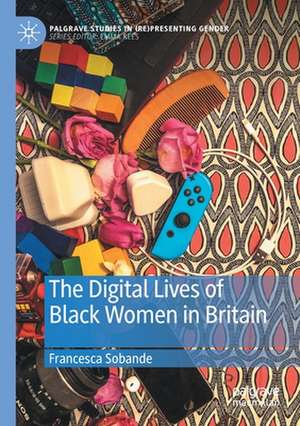The Digital Lives of Black Women in Britain: Palgrave Studies in (Re)Presenting Gender
Autor Francesca Sobandeen Limba Engleză Paperback – 13 aug 2021
Chapters 2 and 4 are available open access under a Creative Commons Attribution 4.0 International License via link.springer.com.
| Toate formatele și edițiile | Preț | Express |
|---|---|---|
| Paperback (1) | 261.53 lei 6-8 săpt. | |
| Springer International Publishing – 13 aug 2021 | 261.53 lei 6-8 săpt. | |
| Hardback (1) | 266.92 lei 6-8 săpt. | |
| Springer International Publishing – 12 aug 2020 | 266.92 lei 6-8 săpt. |
Preț: 261.53 lei
Nou
Puncte Express: 392
Preț estimativ în valută:
50.04€ • 52.25$ • 41.42£
50.04€ • 52.25$ • 41.42£
Carte tipărită la comandă
Livrare economică 04-18 aprilie
Preluare comenzi: 021 569.72.76
Specificații
ISBN-13: 9783030466817
ISBN-10: 3030466817
Pagini: 149
Ilustrații: X, 149 p.
Dimensiuni: 148 x 210 x 15 mm
Greutate: 0.22 kg
Ediția:1st ed. 2020
Editura: Springer International Publishing
Colecția Palgrave Macmillan
Seria Palgrave Studies in (Re)Presenting Gender
Locul publicării:Cham, Switzerland
ISBN-10: 3030466817
Pagini: 149
Ilustrații: X, 149 p.
Dimensiuni: 148 x 210 x 15 mm
Greutate: 0.22 kg
Ediția:1st ed. 2020
Editura: Springer International Publishing
Colecția Palgrave Macmillan
Seria Palgrave Studies in (Re)Presenting Gender
Locul publicării:Cham, Switzerland
Cuprins
1. Why the Digital Lives of Black Women in Britain?.- 2. Black Women and the Media in Britain.- 3. Black Women’s Digital, Creative and Cultural Industry Experiences.- 4. Black Women’s Digital Diaspora, Collectivity and Resistance.- 5. (Un)Defining the Digital Lives of Black Women in Britain.
Notă biografică
Dr. Francesca Sobande is a lecturer in digital media studies at the School of Journalism, Media and Culture at Cardiff University, Wales. She is co-editor, with Akwugo Emejulu, of To Exist is To Resist: Black Feminism in Europe (2019).
Textul de pe ultima copertă
“Sobande’s book is a landmark study of Black British women and their double struggle with and for their media representations. Sobande’s playful text deftly shifts between media theory and digital practice in order to showcase how Black British women are re-making themselves through a variety of digital media.” —Akwugo Emejulu, University of Warwick, UK
“This is an engaging, rigorously researched documentation of the culturally significant but often neglected digital experiences of Black women. As Sobande so vividly explains, this is a story rooted offline, one of intersecting ‘in real life’ oppressions and structural racism, a story grounded in the particular history of Black women in Britain organising and creating spaces for themselves.” —Rebecca Omonira-Oyekanmi, reporter, editor and writer, UK
“This book adds to the important but limited literature on the realities of Black women's experiences in the UK. The book offers a timely and deft treatise of the digital strategies that Black British women use to navigate their world. Whether it's hair tutorial videos on YouTube or clever Twitter banter, Black women in Britain are using the internet in innovative ways and Francesca Sobande offers an excellent guide to these practices.”—Moya Bailey, Northeastern University, USA
“Sobande’s work thrusts open the doors of an area of limited research to date. Scholars, teachers and students alike will want to reach for this book time and time again. I know this will fast become a new favourite on the reading lists of my journalism students!” —Marverine Duffy, Birmingham City University, UK
Based on interviews and archival research, this book explores how media is implicated in Black women’s lives in Britain. From accounts of twentieth-century activism and television representations, to experiences of YouTube and Twitter, Sobande's analysis traverses tensions between digital culture’s communal, counter-cultural and commercial qualities.
Chapters 2 and 4 are available open access under a Creative Commons Attribution 4.0 International License via link.springer.com.
Francesca Sobande is a lecturer in digital media studies at the School of Journalism, Media and Culture at Cardiff University, Wales.
“This is an engaging, rigorously researched documentation of the culturally significant but often neglected digital experiences of Black women. As Sobande so vividly explains, this is a story rooted offline, one of intersecting ‘in real life’ oppressions and structural racism, a story grounded in the particular history of Black women in Britain organising and creating spaces for themselves.” —Rebecca Omonira-Oyekanmi, reporter, editor and writer, UK
“This book adds to the important but limited literature on the realities of Black women's experiences in the UK. The book offers a timely and deft treatise of the digital strategies that Black British women use to navigate their world. Whether it's hair tutorial videos on YouTube or clever Twitter banter, Black women in Britain are using the internet in innovative ways and Francesca Sobande offers an excellent guide to these practices.”—Moya Bailey, Northeastern University, USA
“Sobande’s work thrusts open the doors of an area of limited research to date. Scholars, teachers and students alike will want to reach for this book time and time again. I know this will fast become a new favourite on the reading lists of my journalism students!” —Marverine Duffy, Birmingham City University, UK
Based on interviews and archival research, this book explores how media is implicated in Black women’s lives in Britain. From accounts of twentieth-century activism and television representations, to experiences of YouTube and Twitter, Sobande's analysis traverses tensions between digital culture’s communal, counter-cultural and commercial qualities.
Chapters 2 and 4 are available open access under a Creative Commons Attribution 4.0 International License via link.springer.com.
Francesca Sobande is a lecturer in digital media studies at the School of Journalism, Media and Culture at Cardiff University, Wales.
Caracteristici
Fills an important gap in knowledge of the digital and everyday lives of Black women in Britain, particularly in relation to platforms such as YouTube and the changing landscape of media representation and resistance Reflects on the narratives of Black women who were interviewed and analysis of Black women’s digital content production Contributes to conversations concerning identity, inequality, and digital activity through thinking rooted in Black feminism and intersectionality












